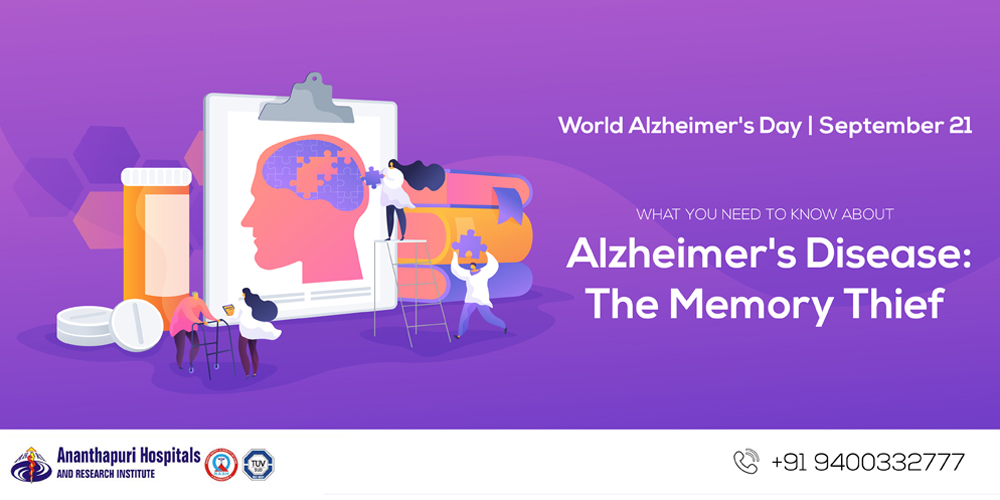- 21/September/2019

World Alzheimer's Day - Ananthapuri Hospitals , Trivandrum
Memories are the biggest treasure of a human being. When those are of your loved ones, it is even better. Imagine if all those memories that you collected over a lifetime disappeared, just like that? Alzheimer’s disease, the memory thief, can steal away your beloved memories!
The disappearance of your memories might sound nightmarish, there is no denying it. But are memories the only thing that define you?
Quoting the words of neuroscientist and author of "Still Alice," Lisa Genova - “Diagnosis doesn't mean you are dying tomorrow, keep living. You won't lose your emotional memory, you will still be able to understand love and joy. You might not remember what I said 5 minutes ago, but you will remember how I made you feel. You are more than what you can remember”.
World Alzheimer's Day falls on the 21st of September every year. It is celebrated with the aim of raising awareness about the disease. Here are a few important things you need to know about this disease:
Alzheimer's is a brain disease which causes a serious effect on a person’s ability to carry out daily activities. Alzheimer's happens when proteins (called plaques) and fibers (called tangles) build up in your brain, block nerve signals and destroy nerve cells.
This disease usually affects people over 65 years old and is considered to be progressive - which means it gets worse over time. Some glitches in gene make you more likely to get Alzheimer’s.
What's the Difference Between Dementia and Alzheimer's Disease?
Dementia and Alzheimer’s are often used interchangeably and confused with each other. Know how they are different!
Dementia is an overall term used to describe brain disorders that make it hard to remember, think clearly, make decisions, or even control your emotions.
Alzheimer’s disease is the most common type of dementia, which involves one of these brain disorders.
What Are the 7 Stages of Alzheimer's?
The type and severity of symptoms through the stages vary from person to person. The following are the seven stages of Alzheimer’s along with the symptoms. Keep in mind that these symptoms might not be Alzheimer's at all, but simply normal changes from ageing.
Stage 1: Appears Normal
The person does not show any unusual symptoms that you can spot. Only a careful medical evaluation, including mental status testing and brain imaging exams, can reveal whether the person has got Alzheimer's.
Stage 2: Subtle Changes
The person shows subtle symptoms like forgetting a word or misplacing objects. These symptoms often go unnoticed as these don't interfere with the person’s ability to work or live independently.
Stage 3: Very Mild Deterioration in Memory
The person’s ability to think and reason gets affected. For instance, they forget something they just read, and/or asks the same question over and over again.
Stage 4: Mild Deterioration in Memory
The person starts experiencing new issues, along with more severe symptoms of stage 3. They tend to forget what month or season it is and also details about themselves.
Stage 5: Moderate Deterioration in Memory
The person might start to lose track of what time it is. The person starts to forget his personal details like phone number, address and so on.
Stage 6: Severe Deterioration in Memory
The person might find it difficult to remember names, can mistake a person for someone else, and also needs help going to the bathroom. They may also start having delusions. For example, he thinks he needs to go to work even though he no longer has a job.
Stage 7: Critical Deterioration in Memory
The person might find it difficult to perform basic activities like eating, walking, and sitting up. The condition worsens to an extent that the person can no longer tell when they're thirsty.
Can Alzheimer's cause death?
Alzheimer’s disease destroys neural network in the brain and this eventually makes it difficult for the patient to do ordinary things like moving around and feeding themselves. Even though this disease devastates the brain, it does not cause death by itself. The resulting complications of the decline in brain function are what causes death.
A vast majority of people with Alzheimer’s die from aspiration pneumonia - when food or liquid go down the windpipe instead of the oesophagus, causing damage or infection in the lungs that develops into pneumonia.
What are the treatments for Alzheimer's?
As with any disease, for Alzheimer’s, it is always best for the patient to start treatment during the early stages itself. Although Alzheimer’s disease is irreversible and has no cure, there are medicines that can slow down the progression of the disease, and help the brain work better for longer.
Doctors use medicines like Galantamine to treat mild to moderate confusion related to Alzheimer's disease. It is always best to talk to a doctor about which option may work best for the patient.
------------------------------------------------------------------------------------------
The best way to prevent Alzheimer’s disease is by following certain lifestyle habits such as regular checkups, exercise, socialising, and taking precautionary measures against head injuries.
Department of Neurology of Ananthapuri Hospitals has experienced medical professionals who are experts in managing and treating various neurological disorders including Alzheimer's Disease.
To book an appointment, call us at +91 9400332777 or visit our hospital at Chacka, NH Bypass, Thiruvananthapuram.

